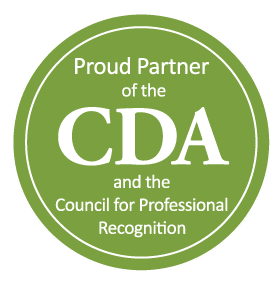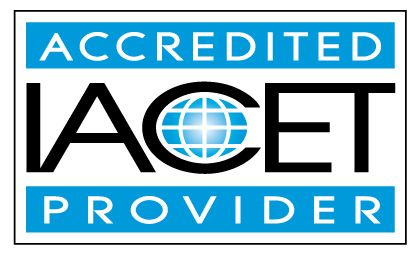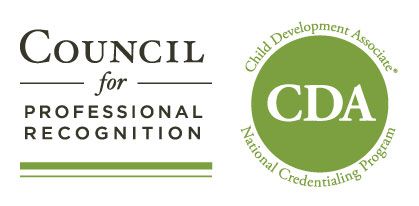GUIDE TO PREPARING FOR YOUR CDA CREDENTIAL
A teacher’s level of training can have a significant effect in many areas, including career growth, quality of care they provide and job satisfaction. While there are many options for continuing education, the Child Development Associate® (CDA) Credential is the most well-recognized certification program in early childhood education and a stepping stone to growing as a professional in the Early Childhood Education field
The CDA credentialing program is administered by the CDA Council at the Council for Professional Recognition, a non-profit organization whose mission is to “promote improved performance and recognition of professionals in the early childhood education of children ages birth to 5 years old.”
 SafeGard Classes Online is priviledged to be a Proud Partner to the CDA Council and an IACET Accredited Provider, allowing us to offer high-quality online classes to meet the continuing education requirements (CEUs) for the CDA Credential. We currently offer the 120-hour early childhood education training for the Infant/Toddler, Preschool and Family Child Care settings.
SafeGard Classes Online is priviledged to be a Proud Partner to the CDA Council and an IACET Accredited Provider, allowing us to offer high-quality online classes to meet the continuing education requirements (CEUs) for the CDA Credential. We currently offer the 120-hour early childhood education training for the Infant/Toddler, Preschool and Family Child Care settings.
While the CDA Council has lots of very important and helpful resources for preparing, applying, and earning a CDA credential, this guide offers additional guidance to help candidates in their pursuit. The process to earn your CDA credential can be daunting but fear not--we’ll break it down step-by-step. Here is an overview of the process:
What You’ll Need to Do
The CDA Credentials are offered in four categories, or “settings.” The CDA credential is different for each setting, so you need to identify the appropriate setting for your situation before applying to earn your credential:
- Guide to applying for a Center-Based Infant-Toddler credential
- Guide to applying for a Center-Based Preschool credential
- Guide to applying for a Family Child Care credential
- Guide to applying for a Home Visitor credential
Many of the requirements can be completed before you even apply. Once you submit your application to the CDA Council, you will have 6 months to complete all your requirements so you may consider completing some of the lengthier requirements (such as the 120-hrs of training) prior to submitting your application.
There are a few eligibility requirements for the CDA credential. You must be a high school graduate with a valid diploma or GED. The exception to this requirement is for juniors or seniors in a high school career and technical program that is focused on early education and/or child development.
Here’s where the heavy lifting begins. To earn your CDA you’ll need to: 1) complete 120 hours of education that specifically cover the eight subject areas for the credential (see next section); 2) achieve 480 hours of experience in the field, working with young children and finally; and 3) you must prepare your Professional Portfolio according to the applicable CDA Competency Standards book.
Completing the Continuing Education Requirement
All CDA applicants must complete a full 120 hours of training for professional early childhood education. Training must include at least 10 hours in each the CDA’s eight subject areas:
- How to create a safe and healthy learning environment
- Understanding a child’s physical and intellectual development process
- Understanding the social and emotional development of young children
- How to form productive relationships with families
- How to manage and make program operation more effective
- Professionalism
- How to observe and record children's behavior correctly
- Understanding the principles of learning and child development
Your training will need to be from a good educational resource that offers the CDA curriculum and is accredited to offer Continuing E ducation Units (CEUs). The CDA Council will not accept training from independent consultants or workshops you took at a conference.
ducation Units (CEUs). The CDA Council will not accept training from independent consultants or workshops you took at a conference.
What classes are in the Infant/Toddler 120-hour package?
What classes are in the Preschool 120-hour package?
Experience in the Field
Up to 3 years prior to applying, you’d need to achieve at least 480 hours of professional experience working with young children. The experience must be with the age group that matches the setting for which you are applying, i.e., infant/toddler or preschool.
Your Professional Portfolio, the Verification Visit and Exam
After completing your professional education and work experience (480 hours in the credential setting), you’re ready to apply! You can do so online and enjoy the convenience of automatic updates, easy communication with the Council and other technology perks.
The CDA Council offers several additional resources to help you prepare you for your CDA Exam and Verification Visit. For example, the “Essentials for Working with Young Children” textbook and workbook will help you with the preparation of your Professional Portfolio and study for the CDA exam.
Next, you’ll need to find a CDA Professional Development Specialist to do your Verification Visit. Use the Council’s directory to find one near you, who meets your parameters for classroom setting and language.
When your PD Specialist arrives at your workplace for the Visit, he or she will complete the following steps:
- Review your Professional Portfolio, transcripts and/or certificates from your Professional Education coursework, and Family Questionnaires.
- Observe you working with children and record applicable evidence or information.
- Reflect with you about your strengths or opportunities for growth as noted from items #1 and 2.
Don’t forget to get your director’s signature before the visit, and afterward, obtain your PD Specialist’s ID number — you’ll need it later!
Finally, you’ll need to take the CDA exam. When you receive a “Ready to Schedule” notice from the CDA Council, it’s time to schedule your exam. The test includes 65 multiple-choice questions, which includes five scenario questions where a short narrative is required, and candidates have up to an hour and 45 minutes to complete it.
You can take the exam at a testing center near you. CDA Exams are provided through the Council’s partner, Pearson VUE.
Almost Done…
After you have completed all the required steps, you should receive your credentialing decision from the Council within a week if there are no errors or missing information. Exam  and Verification Visit scores are generally transmitted within 24-48 hours of completion, and the decision takes 1-3 business days from that point.
and Verification Visit scores are generally transmitted within 24-48 hours of completion, and the decision takes 1-3 business days from that point.
However, if information is missing or there are errors, it could take 4-6 weeks to receive your credentialing decision as errors are corrected and/or missing information is retrieved. You will receive a notice by mail about your credentialing decision.
Don’t Forget to Renew in 3 Years
If you’ve made it this far, congratulations on earning your CDA! Your Credential will be valid for three years from the date it was awarded to you. Up to 6 months prior to its expiration date, you can apply to renew your CDA credential. Since the field of early childhood education is constantly evolving, CDA renewals also offer an opportunity to learn new and innovative education practices.
Be sure to apply for your renewal before your CDA expiration date. Once it has expired, you won’t be able to renew and will have to start the full credential process over again. SafeGard Classes Online offers several online CDA renewal packages to meet the renewal’s continuing education requirements as well.
Definitions to Commonly Used Terms
The CDA credential and educational programs will often use terms that you may not be familiar with.
Center-Based Program: A childcare program with at least 10 children enrolled and at least two caregivers.
Competency Standards: These are eight areas of criteria that defines the skills you need to demonstrate as a credentialed CDA.
Functional Areas: These are areas of responsibility defining a caregiver’s role in relation to the children they work with.
Professional Portfolio: As part of the preparation process, you must compile a Professional Portfolio consisting of your education documentation, family questionnaires, reflective statements in which you express your competence, resources and a professional statement about your philosophy.
R.O.R. Model: R.O.R. is an acronym for Review, Observe and Reflect — the three actions a CDA Professional Development Specialist will complete during your Verification Visit.
For a comprehensive list of FAQs about the CDA credential, please visit the CDA Council’s website.
Additional Resources
What is a CDA and how do you earn a CDA?
How long does it take to earn your CDA?
How to choose the best CDA package
Ensuring high-quality training classes
Webinars and tutorials about the process

